This article relies largely or entirely on a single source. (February 2024) |
| Millennium: | 1st millennium |
|---|---|
| Centuries: | |
| Decades: | |
| Years: |
| 312 by topic |
|---|
| Leaders |
| Categories |
| Gregorian calendar | 312 CCCXII |
| Ab urbe condita | 1065 |
| Assyrian calendar | 5062 |
| Balinese saka calendar | 233–234 |
| Bengali calendar | −281 |
| Berber calendar | 1262 |
| Buddhist calendar | 856 |
| Burmese calendar | −326 |
| Byzantine calendar | 5820–5821 |
| Chinese calendar | 辛未年 (Metal Goat) 3009 or 2802 — to — 壬申年 (Water Monkey) 3010 or 2803 |
| Coptic calendar | 28–29 |
| Discordian calendar | 1478 |
| Ethiopian calendar | 304–305 |
| Hebrew calendar | 4072–4073 |
| Hindu calendars | |
| - Vikram Samvat | 368–369 |
| - Shaka Samvat | 233–234 |
| - Kali Yuga | 3412–3413 |
| Holocene calendar | 10312 |
| Iranian calendar | 310 BP – 309 BP |
| Islamic calendar | 320 BH – 319 BH |
| Javanese calendar | 192–193 |
| Julian calendar | 312 CCCXII |
| Korean calendar | 2645 |
| Minguo calendar | 1600 before ROC 民前1600年 |
| Nanakshahi calendar | −1156 |
| Seleucid era | 623/624 AG |
| Thai solar calendar | 854–855 |
| Tibetan calendar | 阴金羊年 (female Iron-Goat) 438 or 57 or −715 — to — 阳水猴年 (male Water-Monkey) 439 or 58 or −714 |

Year 312 (CCCXII) was a leap year starting on Tuesday (link will display the full calendar) of the Julian calendar. In the Roman Empire, it was known as the Year of the Consulship of Constantinus and Licinianus (or, less frequently, year 1065 Ab urbe condita). The denomination 312 for this year has been used since the early medieval period, when the Anno Domini calendar era became the prevalent method in Europe for naming years.